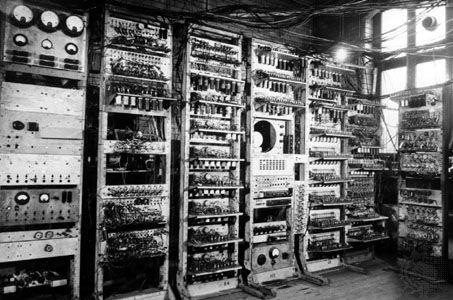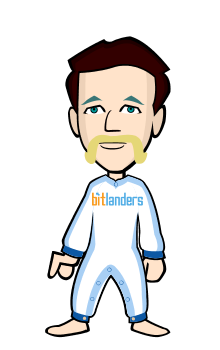There are hundreds of people who have major contributions to the field of computing. The following sections detail the primary founding fathers of computing, the computer, and the personal computer we all know and use today.
Father of computing
 Charles Babbage was considered to be the father of computing after his invention and concept of the Analytical Engine in 1837. The Analytical Engine contained an Arithmetic Logic Unit (ALU), basic flow control, and integrated memory; hailed as the first general-purpose computer concept. Unfortunately, because of funding issues this computer was never built while Charles Babbage was alive.
Charles Babbage was considered to be the father of computing after his invention and concept of the Analytical Engine in 1837. The Analytical Engine contained an Arithmetic Logic Unit (ALU), basic flow control, and integrated memory; hailed as the first general-purpose computer concept. Unfortunately, because of funding issues this computer was never built while Charles Babbage was alive.
However, in 1910 Henry Babbage, Charles Babbage's youngest son was able to complete a portion of the machine that could perform basic calculations. In 1991, the London Science Museum completed a working version of the Analytical Engine No 2, which incorporated his refinements Babbage discovered during his initial development of the Analytical Engine.
Although Babbage never completed his invention in his lifetime, his radical ideas and concepts of the computer are what make him the father of computing.
Father of the computer
 There are several people who could be considered as the father of the computer including Alan Turing, John Atanasoff, and John von Neumann. However, for the purpose of this document we're going to be considering Konrad Zuse as the father of the computer with his development of the Z1, Z2, Z3, and Z4.
There are several people who could be considered as the father of the computer including Alan Turing, John Atanasoff, and John von Neumann. However, for the purpose of this document we're going to be considering Konrad Zuse as the father of the computer with his development of the Z1, Z2, Z3, and Z4.
In 1936 to 1938 Konrad Zuse created Z1 in his parent's living room, this computer consisted of over 30,000 metal parts and is considered to be the first electro-mechanical binary programmable computer. In 1939, the German military commissioned Zuse to build the Z2, which was largely based on the Z1. Later, he completed the Z3 in May of 1941, the Z3 was a revolutionary computer for its time and is considered the first electromechanical and program-controlled computer. Finally, on July 12, 1950 Zuse completed and shipped the Z4 computer, which is considered to be the first commercial computer.
Father of the personal computer
 Henry Edward Roberts coined the term "personal computer" and is considered to be the father of the personal computers after he released of the Altair 8800 on December 19, 1974. It was later published on the front cover of Popular Electronics in1975 making it an overnight success. The computer was available as a kit for $439 or assembled for $621 and had several additional add-ons such as a memory board and interface boards. By August 1975, over 5,000 Altair 8800 personal computers were sold; starting the personal computer revolution.
Henry Edward Roberts coined the term "personal computer" and is considered to be the father of the personal computers after he released of the Altair 8800 on December 19, 1974. It was later published on the front cover of Popular Electronics in1975 making it an overnight success. The computer was available as a kit for $439 or assembled for $621 and had several additional add-ons such as a memory board and interface boards. By August 1975, over 5,000 Altair 8800 personal computers were sold; starting the personal computer revolution.



